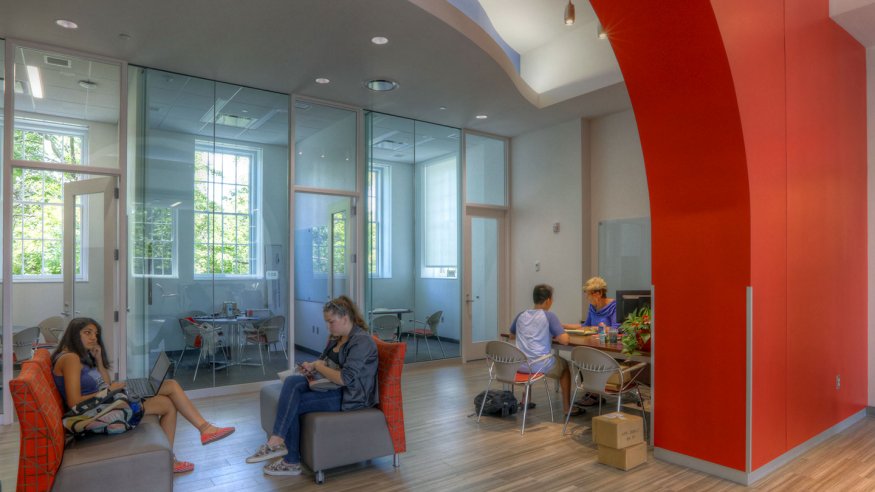
Theory-to-Practice
Ohio Wesleyan Awards Spring 2021 OWU Connection Grants to Support Student Learning
DELAWARE, Ohio – Ohio Wesleyan University students will explore the impact of ecotourism in Iceland, the response of Alaska’s museums and zoos to climate change, and other topics using nearly $30,500 in newly awarded, university-funded Theory-to-Practice Grants.
The grants, awarded three times a year, are part of Ohio Wesleyan’s signature program, The OWU Connection. The program is designed to help students think big (understand issues from multiple academic disciplines), go global (gain international perspective), and get real (translate classroom knowledge into real-world experience).
Those earning spring 2021 Ohio Wesleyan Theory-to-Practice Grants and their projects include:
- “America the Beautiful: Documenting American Farm Life,” submitted by Meghan Edwards, a junior from Columbus, Ohio. Edwards will create a geographic storytelling project that captures the concerns and experiences of today’s farmers. Edwards will present her work as an interactive map and document her work at megedwards.com/americathebeautiful.
- “Summer Workshops in Devised Theatre,” submitted by Jasmine Lew, a junior from Fremont, California. Lew and six other Ohio Wesleyan students will study with the theatre company The TEAM to learn about Devised Theatre techniques, a method of theatre-making that originates from collaborative, often improvisatory work. Lew also will study with Sojourn Theatre to learn more about Devised Theatre from a directing and social justice standpoint. All of the students will incorporate their learning this fall into Lew’s theatre senior capstone project, which will examine the female experience. Lew is being mentored by Ed Kahn, Ph.D., professor emeritus of Theatre.
- “Deletion subunit of NMDAR using CRISPR/Cas9,” submitted by Hien Mai, a junior from Ho Chi Minh City, Vietnam. During fall semester, Mai will use a naturally occurring gene-editing tool called CRISPR/Cas9 to explore synaptic plasticity. Mai says, “Synaptic plasticity is the ability of signals between neurons to strengthen or weaken over time.” With her work, she will “use a designed CRISPR/Cas9 system to inactivate a key receptor in neurons to learn about the effect of this receptor on synaptic plasticity.” Laura Tuhela Reuning, Ph.D., part-time professor of Botany/Microbiology and Zoology, will mentor Mai in her research. Tuhela Reuning notes, “This is cutting-edge research involving one of the most transformational tools in molecular biology.”
- “Defrosting Seward’s Icebox: Climate Change and Museums in Alaska,” submitted by Josh Pletcher, a senior from Wellington, Colorado, and Alan Cohn, a junior from Newton Falls, Ohio. Pletcher and Cohn will travel to Alaska, visiting museums and zoos in Anchorage, Seward, Kodiak, and Fairbanks to study how the facilities are responding to climate change. The students also will visit Kenai Fjords and Denali National Parks to experience firsthand the effects of climate change in the state.
- “Examining Cognitive and Brain Functions through Video Games,” submitted by Navami Shenoy, a sophomore from Mangalore, Karnataka, India. Shenoy will study the effects of video games on the brain under the mentorship of Kira Bailey, Ph.D., assistant professor of Neuroscience and Psychology. Shenoy has designed a game that mimics a standard psychological task used to assess cognitive functioning. Shenoy will collect data this summer to determine whether the game is a valid tool for measuring cognition, which is the process of acquiring knowledge. “This will allow me to modify specific variables in the game to study its cognitive effects on the brain,” Shenoy says.
- “Benefits, Costs, and Spatial Trends of Ecotourism In Iceland,” submitted by Elliot Spicer, a first-year student from Newark, Ohio, and Nathan Rowley, Ph.D., associate professor of Geology and Geography. They will travel to Iceland to explore the recent boom in ecotourism to the country, including its impact on the island community and its finite resources.
After the students complete their OWU Connection experiences, they will prepare reports and presentations based on their objectives and experiences, with many presenting at the university’s annual Student Symposium in the spring.
In addition to Theory-to-Practice Grants, The OWU Connection includes Travel-Learning Courses, mentored research, internships, and more. Learn more at owu.edu/connection.
Founded in 1842, Ohio Wesleyan University is one of the nation’s premier liberal arts universities. Located in Delaware, Ohio, the private university offers more undergraduate majors than many universities its size and competes in 24 NCAA Division III varsity sports. Through its signature program, The OWU Connection, Ohio Wesleyan teaches students to integrate knowledge across disciplines, build a diverse and global perspective, and apply knowledge in real-world settings. Ohio Wesleyan is featured in the book “Colleges That Change Lives” and included on the U.S. News & World Report and Princeton Review “best colleges” lists. Learn more at owu.edu.
